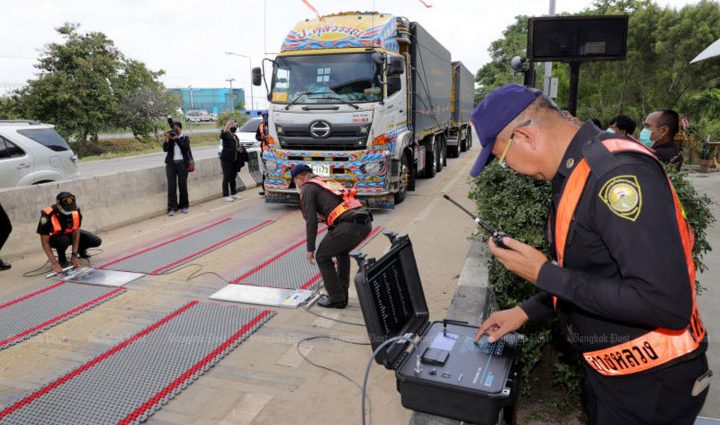Acting division chief says higher-ranking officers and officials from other agencies might also be involved

Forty highway police officers have been transferred for alleged involvement in the overloaded truck bribe-sticker scandal, as an anti-graft panel widens its investigation.
Those transferred include one deputy superintendent, 17 deputy inspectors and 22 non-commissioned officers. Of the total, 12 will face criminal action for taking bribes, said Pol Maj Gen Jaroonkiat Pankaew, commander of the Counter Corruption Division (CCD).
They will be sent to work at the Highway Police Division operations centre pending further action, said Pol Maj Gen Jaroonkiat, who has also been acting as head of the division since the transfer of its leader to an inactive post.
He said he believed more police and officials with higher ranks hight be involved, but they might be from other agencies. A working panel of the National Anti-Corruption Commission (NACC) will extend the investigation, he added.
The scandal, said to have been prevalent for 20 years or more, was first brought to light by Wiroj Lakkhanaadisorn, a Move Forward party list MP-elect. The outspoken politician said overloaded trucks with special stickers were not being detained, nor were their drivers ever arrested.
After the initial reports, Pol Maj Gen Ekkaraj Limsangkat, commander of the Highway Police Division, was transferred to an inactive post at the Central Investigation Bureau on May 30.

Apichart Prairungruang (left), head of the Land Transport Federation of Thailand, meets with Move Forward MP-elect Wiroj Lakkhanaadisorn (right) to discuss the truck sticker-bribery scandal at the party’s headquarters on June 1. (Photo: Somchai Poomlard)
A senior official of the Ministry of Transport admitted on Friday that there were loopholes in the system for regulating overloaded trucks.
The human factor — specifically, the use of discretion in determining which trucks to detain and which ones to let go — needed to be addressed, said Pisak Jitviriyavasin, the ministry’s deputy permanent secretary.
He said the ministry would focus on IT solutions to reduce human discretion and graft as much as possible. Longer-term, a body camera system should be adopted, he said after chairing a meeting of a ministry fact-finding panel on the bribery scandal.
He has instructed the Department of Highways and the Department of Rural Rods to consider the use of body cameras by officers and plans to raise the issue for discussion at the next meeting on June 20.
The Department of Highways operates 97 permanent checkpoints for weighing vehicles and the Department of Rural Roads has five.
The ministry would take disciplinary action against officials found involved in taking bribes from operators of overloaded trucks, Mr Pisak added.
Jirapong Theppitak, deputy director-general of the Department of Highways, said the department had set up two working panels. One will look into alleged wrongdoing involving officials and the other will inspect weighing stations in a bid to improve efficiency.
The Land Transport Federation of Thailand would be invited to give information to the department about alleged bribe-taking involving department officials, he added.

A sticker indicating a bribe has been paid is seen on the windscreen of an overloaded truck. (Twitter: @Wirojlak)

